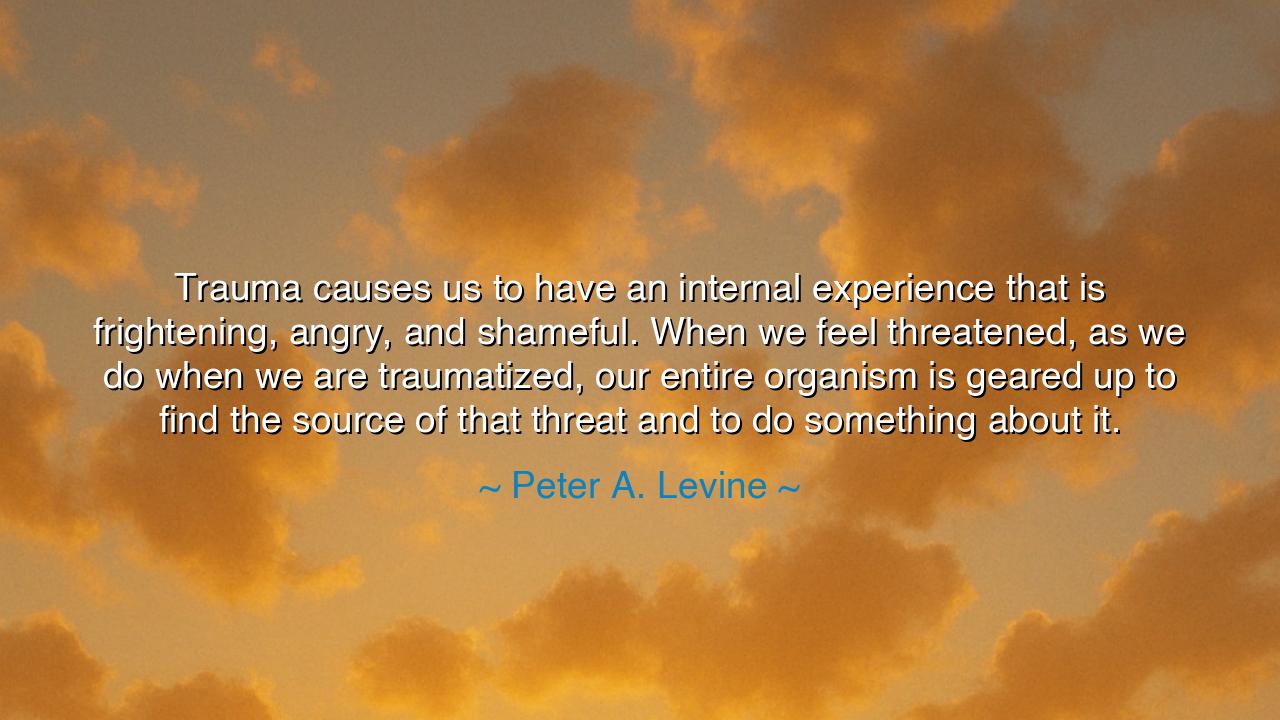
Trauma causes us to have an internal experience that is
Trauma causes us to have an internal experience that is frightening, angry, and shameful. When we feel threatened, as we do when we are traumatized, our entire organism is geared up to find the source of that threat and to do something about it.






Host: The room was filled with a quiet stillness, the only sound the gentle hum of the air conditioning in the background. Jack sat by the window, his gaze lost in the distance, while Jeeny sat across from him, a book in her lap, but her focus was entirely on him. She could tell something was weighing on his mind.
Jeeny: (gently) “You’ve got that look again. What’s on your mind?”
Jack: (pausing, his voice soft) “I was just thinking about a quote from Peter A. Levine. He said, ‘Trauma causes us to have an internal experience that is frightening, angry, and shameful. When we feel threatened, as we do when we are traumatized, our entire organism is geared up to find the source of that threat and to do something about it.’ It made me think about how we carry trauma within us, how it shapes our responses, even when we’re not consciously aware of it.”
Host: Jeeny sets her book aside, her attention fully on Jack. The room feels heavier now, as if the gravity of the topic has settled between them.
Jeeny: (softly) “That’s a powerful way to describe trauma, isn’t it? It’s not just about the events themselves, but about the emotional resonance they leave behind, the way our bodies and minds react. It’s like trauma doesn’t just live in our memories; it becomes a part of how we experience the world, how we react to things — even things that aren’t directly connected to the trauma itself.”
Jack: (nodding) “Exactly. The way Levine describes it — our entire organism reacts to trauma, like we’re on high alert, trying to find the source of that threat. But the problem is, often the source isn’t something that’s easily identifiable in the present moment. Our body stays in that heightened state, and we don’t even realize it. That’s why people sometimes react with anger or fear to things that seem insignificant — because they’re still carrying the weight of past trauma.”
Host: Jeeny takes a deep breath, her expression softening as she considers what Jack said. The room feels more still, as if they’re both absorbing the truth of what trauma does to the mind and body.
Jeeny: (reflectively) “It’s like the body remembers the trauma even when the mind doesn’t fully understand it. It’s in our nervous system, in how we hold ourselves, how we react when we feel threatened, even if that threat is not the same as the original trauma. It’s like we’re always trying to protect ourselves, even when there’s no immediate danger.”
Jack: (quietly) “Yeah. And that constant state of being on guard, of always searching for threats, can be exhausting. It’s like being in a battle that you’re never fully aware of, but your body and mind are constantly fighting, always looking for a way to protect you from something that’s no longer there.”
Host: Jeeny’s eyes soften with understanding as she looks at Jack, sensing the weight of the truth in his words. There’s a quiet pause in the room, the weight of the conversation hanging in the air.
Jeeny: (gently) “Maybe that’s why healing from trauma is so difficult. It’s not just about addressing the memories or the events, but about teaching the body to relax, to trust that the threat is no longer present. It’s about creating a new relationship with those feelings, finding a way to live without constantly being in that state of defense.”
Jack: (nodding slowly) “Exactly. It’s about rewiring that response, learning how to respond to life’s challenges without automatically falling back into that state of fear or anger. It’s not easy, but it’s necessary. Healing doesn’t just happen in the mind — it happens in the body, too.”
Host: The air in the room feels a little lighter now, the weight of the conversation settling into a quieter, deeper understanding. There’s a sense of peace in the realization that trauma is not just something we experience mentally but physically — and that healing requires us to address both the body and mind, to find a way to let go of the constant threat response and live in a more grounded, present way.
Jeeny: (softly) “Healing isn’t just about moving forward; it’s about unlearning the responses that trauma has taught us. It’s about reprogramming how we react to the world, so we can live fully without carrying the weight of past pain.”
Jack: (with a faint smile) “Yeah. It’s about learning to trust the present, to trust that we’re safe now, and to release the hold that trauma has on us.”
Host: The conversation drifts into a peaceful silence, both of them sitting in the quiet realization that healing from trauma is a journey — one that requires both understanding and compassion for the mind and body. In this moment, there’s a shared sense of peace, a reminder that we can heal, slowly, by acknowledging the past while learning to live fully in the present.






AAdministratorAdministrator
Welcome, honored guests. Please leave a comment, we will respond soon